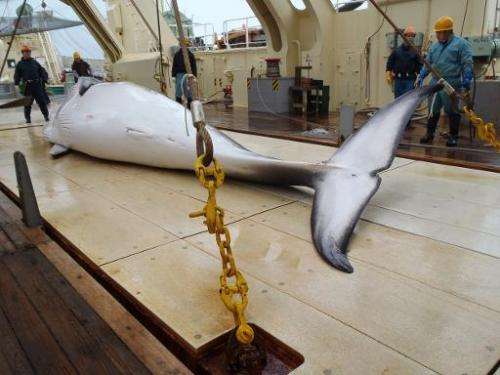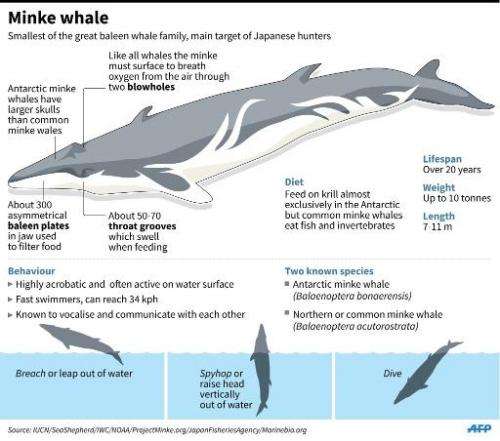Japan whaling ships set out for Antarctic—to count, not hunt

Japanese whaling ships set sail for the Antarctic on Thursday on the look out for whales, but only to count them and take skin samples, after a UN court ordered an end to the annual hunt.
Two ships—the 724-ton Yushinmaru and the 747-ton Daini (No 2) Yushinmaru—weighed anchor from a port in western Shimonoseki city, a major whaling base, a government official said.
A third boat, the Nisshinmaru, will begin its voyage on January 16 to offer logistical support, according to the Japanese Fisheries Agency.
Tokyo has said this season's excursion, expected to last until March 28, will not involve any lethal hunting. Harpoons normally used in the capture of the giant mammals have been removed.
Crew members on the two boats will carry out "sighting surveys" and take skin samples from the huge marine mammals, the agency said.
The non-lethal research by the Institute of Cetacean Research comes after the International Court of Justice—the highest court of the United Nations—ruled in March that Tokyo was abusing a scientific exemption set out in the 1986 moratorium on whaling.
The UN court concluded Tokyo was carrying out a commercial hunt under a veneer of science.
After the ruling, Japan said it would cancel this winter's Antarctic mission, but has since expressed its intention to resume "research whaling" in 2015-16.
In a new plan submitted to the International Whaling Commission (IWC) and its Scientific Committee, Tokyo set an annual target of 333 minke whales for future hunts, down from some 900 under the previous programme.

It also defined the research period as 12 years from fiscal 2015 in response to the court's criticism of the programme's open-ended nature.
Japan killed 251 minke whales in the Antarctic in the 2013-14 season and 103 the previous year, far below its target because of direct action by conservationist group Sea Shepherd.
Tokyo also conducts hunts in the name of science in the Northwest Pacific, where it killed 132 whales in 2013, and off the Japanese coast, where it caught 92.
Despite widespread international opprobrium, Japan has continued to hunt whales using the scientific exemption, although it makes no secret of the fact that the meat from the creatures caught by taxpayer-funded ships ends up on dinner tables.
© 2015 AFP


















